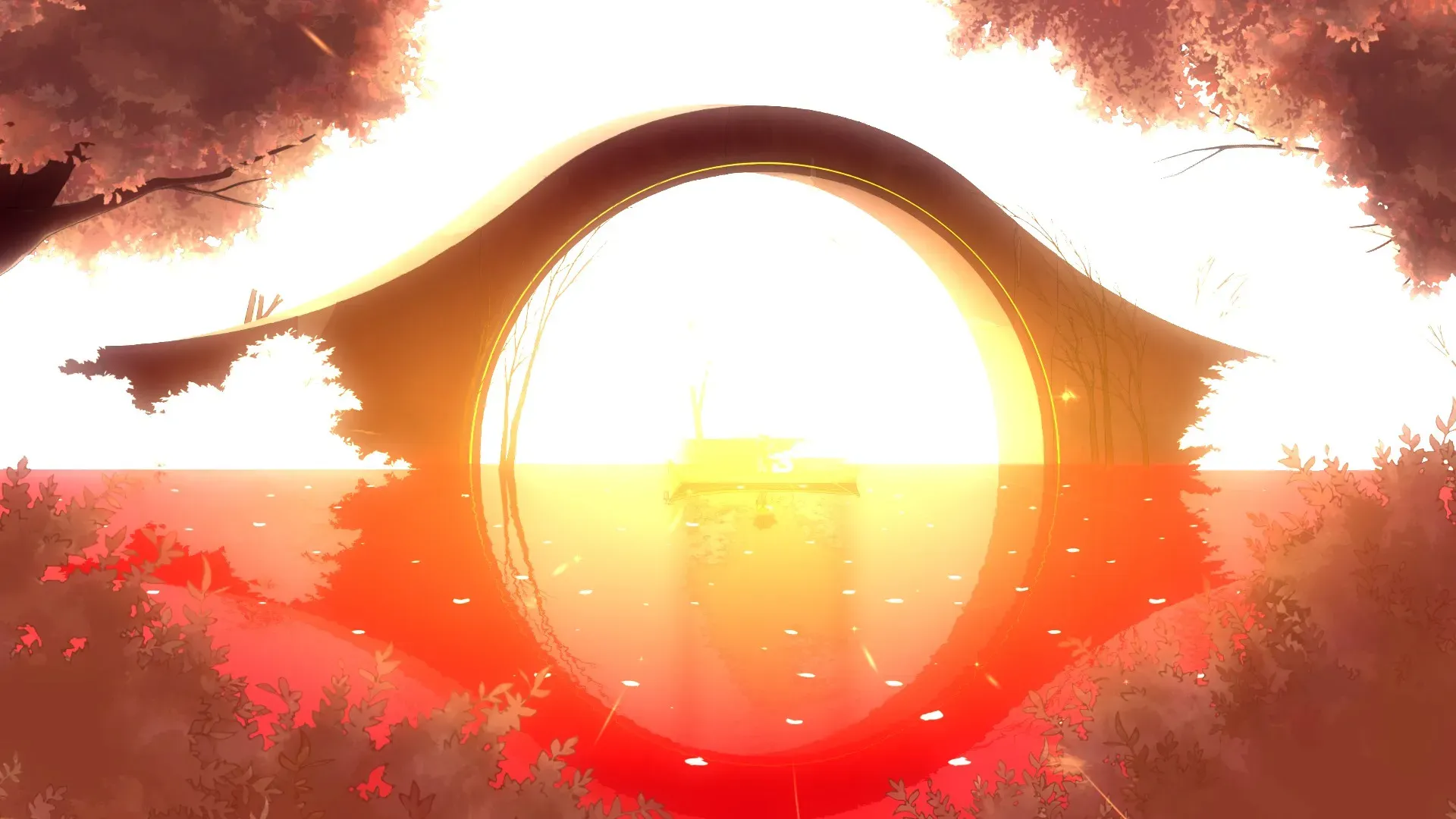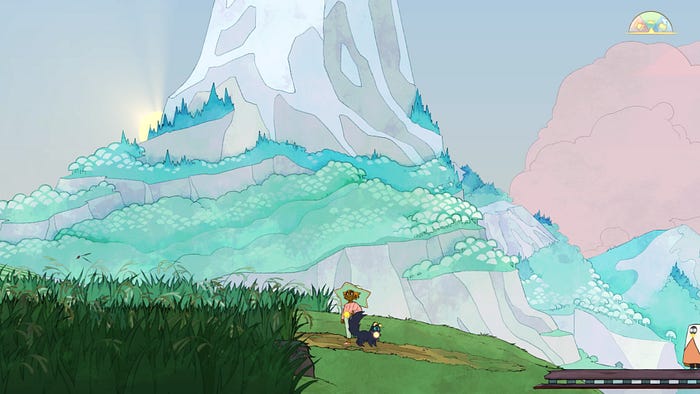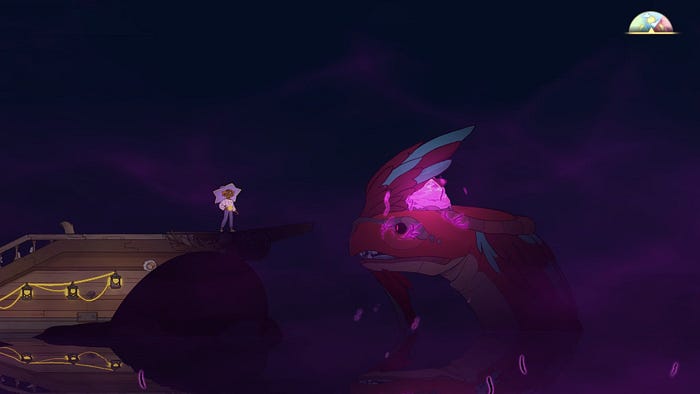Spiritfarer: An Intimate Perspective on Death
Indie games have the power to delve into challenging topics

Spiritfarer, from Thunder Lotus Games, is described as ‘a cozy management sim about death’. You play as Stella along with her cat Daffodil, tasked by Charon to takeover his harrowing duties of accompanying spirits to the Everdoor to pass on. (Note: Daffodil can be played as a second player in splitscreen co-op or online).
The sim aspects include farming, cooking, fishing, mining, smelting, and general resource gathering. This game also includes light platforming across the backs of dragons, and double jumping or gliding through mini-games. And as in most sim games, we build relationships with characters and perform tasks for them.
The art style has a mystical Studio Ghibli feel, inspired by painters Hiroshi Yoshida and Hayao Miyazaki. Stunning backdrops of the Japanese countryside feel like freshly painted watercolors and have a calming and serene effect. The pastel palate opens your imagination to far-off places, untouched by human hands.

Challenging narratives for changing audiences
Spiritfarer’s theme centers around hospice care, death, and the afterlife, themes rarely touched in video games. In a recent interview on Origin Stories Podcast, Nick Gieren, the creative director behind Spiritfarer, discussed his opinions on the shift in the industry.
People who identify as ‘gamers’ are getting older, and as much as I hate to admit it, it’s true. The deep discussions and exciting nostalgia are usually with gamers my age that are in their 30s. We grew up playing games in the 80s and 90s, some of us are entering our 40s and even have kids.
Indie games are a shift away from the ‘core audience’ of gamers that Nick defines as the AAA crowd that focuses on ‘occidental males between 14–21’. By trying to reach a ‘core’ gamer group, developers are restrained in narratives, mechanics, and ‘catch-all’ gameplay in order to hit monetary targets.
Nick Gieren brings up the diverse audience of gamers that didn’t exist 20–30 years ago. Games now appeal to many cultures, genders, and ages, as well as an emerging ‘indie’ crowd who enjoy the relaxing and calming gameplay of smaller titles. Video games are also cheaper and easier to produce than in the past. Systems such as Unity and crowdfunding have made this possible.


So what do I define as a difficult narrative? Few games talk about death as a central subject and generally, it’s a topic that causes discomfort, especially thoughts of a loved one’s death or reflecting on our own mortality.
I did not expect Spiritfarer to have such a profound emotional impact. Strangely, each story felt oddly familiar and painfully touching. And I will admit Stella was one of the few ‘voiceless protagonists’ that I enjoyed. Very little is revealed about Stella from the start, but we do find out she is a hospice nurse with a connection to each spirit, whether family, friend, or teacher.
To get into these difficult narratives, I will be doing a character analysis on two spirits. There is not a lot of information on the surface of Spiritfarer, and the player must have many conversations and pay attention to the little things such as likes and dislikes, house decor, interactions with other spirits, and their Spirit Flower type. The reason I picked these two spirits is that there are general positive feelings toward Summer and negative for Bruce and Mickey, which is important when writing about death.

Summer the Snake
Summer’s childhood was spent on a midwest farm under strict parents. She became an agronomic engineer and was hired immediately by a large farming corporation. She excelled in her profession, and with the use of GMOs and heavy chemicals, delivered swaths of produce on enormous parcels of land. Unfortunately, the heavy use of unregulated chemicals in her agriculture profession caused her to develop breast cancer. Summer left the accursed town and greedy corporations, in search of clarity and healing.
Summer’s life changed when she met Rose, Stella’s aunt. It seemed the only thing that would heal Summer was the unbound love of another. Rose was a joyful person, ‘filled to the brim with uncontainable life’, and this loving and enriched partnership healed Summer’s poisoned body and resentment towards her past.
As her cancer went into remission, Summer sold everything to buy a quaint home with Rose and take up biodynamic farming, where she learned to ‘listen to the plants’ and develop a universal love for all life, inner peace, and balance. Instead of stripping the soil, pumping fertilizers, and killing the insects, she embraced a sustainable approach along with Rose’s keen intuition. They lived many years together sharing a selfless deep love for each other and a spiritual way of life.
But time marches on, and years pass, and life could no longer hold Rose. Summer was overtaken with grief by Rose’s death, and her life began to fall apart. When the cancer returned, as it often does, there was no fight left in Summer. She left for the spirit world soon after where she found Stella.
Spirit life of Summer the Snake
Summer is a boa that wears a hooded green cloak, fastened with her Spirit Flower, the Oxeye Daisy, at the chest level. Her ‘arms’ are her snake torso looped through one armhole, and her tail acting as another. She enjoys a healthy lifestyle, her favorite meal being grain salad, and she has a bit of a sweet tooth and loves desserts. Her demeanor is pleasant and when in a great mood, she sings Plantasia Fantastica to accelerate the growth of all crops.
Summer’s home is decorated with flourishing greenery, natural stones, and a meditation area with an altar for her healing stones. The daisy adorned to her chest represents patience, seen in her battle with cancer, deep relationship with Rose, and an experienced green thumb. She teaches Stella how to care for the field and garden, and introduces her to the art of meditation as medicine for the mind and soul. Summer gently honors Rose’s legacy through her way of living.

Soon we learn the dragon is a metaphor for the four stages of Summer’s breast cancer. Each painful encounter lower’s Summer’s mood and leaves her deep in thought and lamenting the past. While meditating, Summer speaks of her father’s own failed battle with cancer, trying to fight it with brute force, and it ultimately broke him. Meditation draws similarities to cancer, in that we cannot control life as we cannot control our thoughts. We are mere visitors in this place, and we must find compassion for ourselves and those stuck on this rock with us.
The mind is not empty, Stella. It is a beast, savage and untamed. Violent and caring. Loving and destructive. Hateful, curious, scared. Much like the dragon, it cannot be controlled. It must be allowed to roam free.
The Metastatic Coil
Summer’s last quest is a tribute to her final battle with stage four breast cancer. Rather than continue fighting it, Summer chooses to exit gracefully, acknowledging the cancer will always return stronger and be eternally part of her. She struggles with thoughts of a grand accomplishment to leave her mark on this world, and anxiety settles deep into her bones manifesting as a feeling of failing Rose. But Rose always knew the dragon would take her. Summer admits shame at her deep hatred towards the dragon and all it represented, and that it could not be loved.
We are but a few particles of thought on the vast stream of consciousness. All things change, all things end.
Summer was the first patient to die in Stella’s care as an end-of-life nurse, and left a deep imprint on her soul.

Mickey and Bruce
Mickey and Bruce were brothers in life, deeply connected and inseparable. They grew up on the east coast, most likely Boston, and were raised on ‘the wrong side of the tracks' as the saying goes. They did odd jobs for the Italian Mafia, and would take any request no matter how illegal.
Bruce did the talking and a lot of it. Mouthy, abrasive, and offensive, he would speak before thinking which always led to fights. Mickey operated as the enforcer, throwing his weight around and finding pleasure in knocking skulls. Their dealings with the Italian Mafia brought in the money, both gaudy in tastes and relishing in a lavish lifestyle, often competing with acquaintances for the biggest and best homes and cars.
One evening after too much drink, Mickey got behind the wheel of the car and lost control. His car swerved off an overpass, plunging into a lake. And he never woke up. Bruce stayed by his side at the hospital for six months, speaking for him and making ridiculous requests, convinced he saw Mickey’s rage through his catatonic state. Bruce is unable to come to terms that although alive, Mickey was gone.
Mickey and Bruce in the spirit world
Bruce’s flower is the heliotrope, representing the eternal devotion to Mickey, while Mickey carries the fennel flower as a tribute to his lost strength. Essentially this duo is one spirit because they travel together. You won’t like Mickey and Bruce. They are demanding, rude, intrusive, insulting, and lower the mood of every single soul on your ship due to their bullying. I was trying to find a way to get them to the Everdoor as soon as possible.
Bruce is a chatty hummingbird with a New Jersey accent and does all the talking. Mickey is the water buffalo who never says a single word, yet eats all the food Bruce demands. At first, this pair struck me as an ‘Of Mice and Men’ duo. The skinny fast talking hummingbird protecting the large and challenged water buffalo, akin to George and Lennie. But as we learned from their life story, Mickey is not challenged, but in a coma, which is why Mickey carries him around and tells everyone what he’s thinking.

The requests become more and more outlandish, starting with the mansion of marble and gold mirrors, to the multiple food items, ending with an impossible demand for carrots and peaches as an initiation for Stella to become a part of their ‘crew’. Through these requests, Bruce becomes increasingly frustrated and distrustful, leading to the acceptance that he’s lost his partner and Stella cannot fill the void. Bruce finally asks to be taken to the Everdoor.
Listen. Let’s just get on. I can’t do this job without my brother.
As they travel to the Everdoor, we witness the beating down of Bruce’s morale and cynicism towards life. If there is no Mickey, Bruce doesn’t want to be a part of it. His life is meaningless without his brother, and he admits that he doesn’t know how to change, nor is he willing. In some sort of Shakespearean tragedy, we find out that Bruce ended his own life, which is why they exited together, at peace eternally in the stars. And Even though the pair were insufferable, the story of Mickey’s denial was heartbreaking. They also represent difficult hospital patients and family members who struggle with acceptance of death.
Nobody Changes. Anybody else who tells you otherwise is lying. None of this shit matters. None of it. I can’t see a life beyond my brother. If he goes, I go.
The quotes from each character at their final moments contrast vastly regarding death and change. Thunder Lotus did an excellent job with each spirit’s views on life and death. They are not pushing a single viewpoint, but rather showing us that death will be a very personal experience shaped by our pasts and people along the way. The trip to the Everdoor reveals Stanley’s fear, Bruce and Mickey’s anger, Alice’s confusion, Gustav’s pragmatism, Gwen’s regret, Summer’s bargaining, and Elena’s stoicism.

The leitmotif heard on the title screen of the game soon left me with a tight chest and a lump in my throat as it accompanied each spirit through the Everdoor. But as heart-wrenching as some of these stories, Spiritfarer is not inherently a sad game. The wide smiles, abundant hugs, vibrant colors, and support of each spirit walking the departed to the bow of the boat made it more tolerable to play. It really is a game of death positivity and breaking the barriers of western culture’s disconnected approach to viewing death.
I believe Spiritfarer is an important game that demonstrates not only tackling difficult subjects but challenges our belief system about death in the real world as well as in video games.
